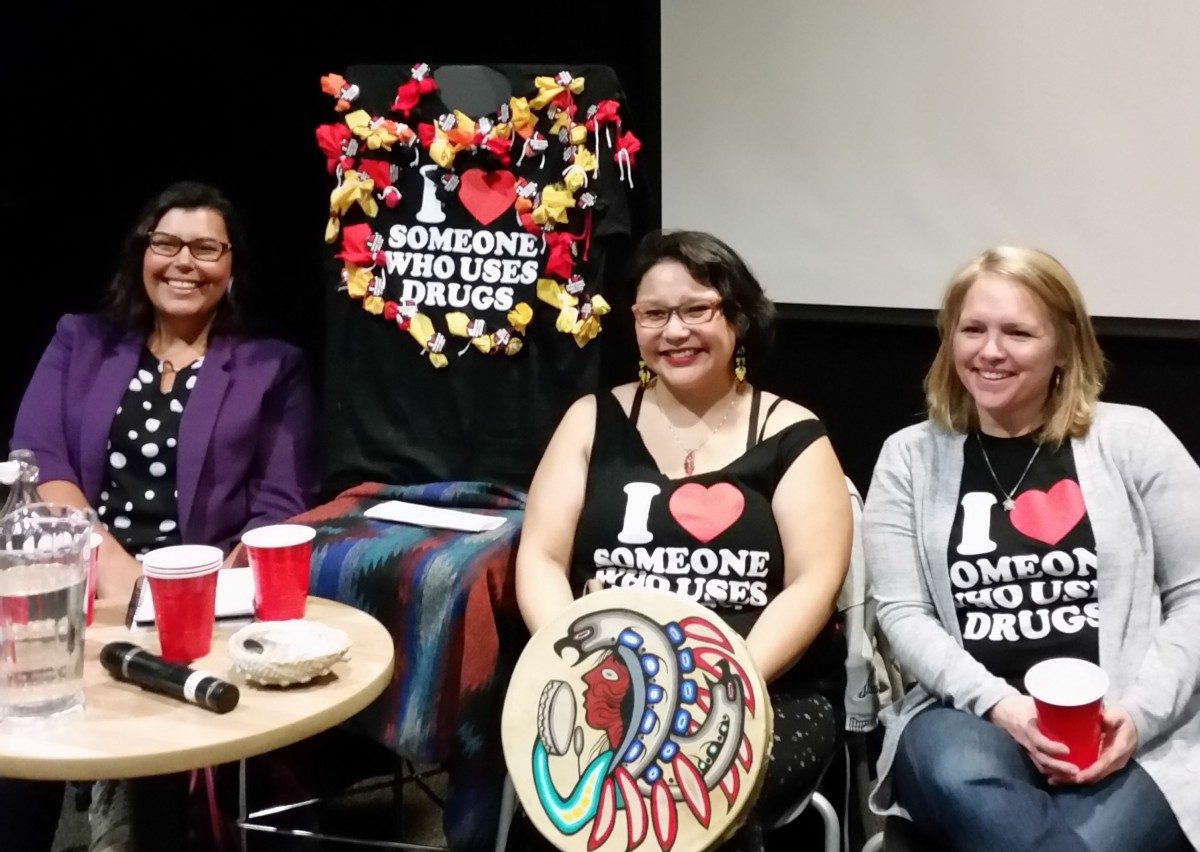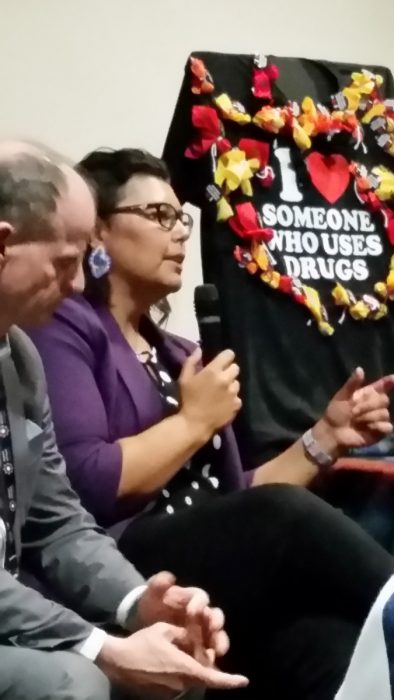
Dr. Marcia Anderson, Dawn Lavand, and Shohan Illsley talk addiction.
Let’s focus on people, not drugs
The Dean’s Lecture Series discusses opioid & crystal meth addiction
Addiction is an illness. Services should be focused on the people affected.
“We need to be willing to address addiction as an illness. We are still less willing to recognize the people, who need the support of public services,” says Dr. Marcia Anderson, executive director of Indigenous Academic Affairs at Ongomiizwin Indigenous Institute of Health and Healing at Rady Faculty of Health Sciences at the U of M.
Anderson was one of the speakers at the April 2 session of The Dean’s Lecture Series, presented by Extended Education at the U of M. Nearly 100 people filled the Carol Shields Auditorium of the Millennium Library to consider Opioid & Crystal Meth: How to Tackle the Problem.
Focusing on substance abuse has never worked, says Anderson. The war on drugs amplified the rates of HIV, Hepatitis C, and overdoses. Eradication of drug use is an impossible goal.
“There is an arbitrary moral distinction between white wine and meth. But really, there are only happy and unhappy relationships with substances.”
Indigenous people are very much affected by addictions and other health challenges.

Dr. Marcia Anderson
Colonialism and racism
The impact of colonialism is the root cause of all Indigenous health gaps, says Anderson. According to an Indigenist stress coping model, the impact of government policy-related decisions like residential schools and the 60s Scoop can be buffered by coping mechanisms. These include connection to family, cultural practices, and language. But when there are more stressors than buffers, it leads to more negative outcomes.
“We need to look at the policy drivers, or we will always be plugging holes,” she says. “By restoring kinship connections, we see a reduction in harms.”
People and personal needs
Dawn Lavand and Shohan Illsley from the Manitoba Harm Reduction Network wore I love someone who uses drugs T-shirts.
Lavand says meth use is not new in Winnipeg. In fact, it was used here 15 years ago, but because no one acknowledged it, we were not prepared to address it, and it festered.
She notes how people struggling with addiction are not self-regulating in many aspects of their lives, including providing for their own basic needs. As a result, she always asks them specific questions. How are you doing? When did you last sleep? Have you eaten? Have you had any water today? She shows care and concern to people acting out, when they don’t expect it.
“If you are comfortable enough with your personal needs being met and you can start complaining about the things around you, that’s pretty awesome. You should be thankful.”
Lavand sang a prayer song to help people arrive safely in their personal journeys, and for people who have passed. She creates prayer tags, displayed around a shirt behind her. “I am not their mother, or their worker. If all we can do is pray for them, that’s a good place to start.”

Learning from HIV
Rick Lees, executive director of Main Street Project, says what we have learned about HIV could be applied to drug addiction.
In 1983, people talked about the behaviours, says Lees. AIDS was called a gay disease, even when HIV infection rates in Africa were mostly in women and children. It was only in 2014 when President Obama lifted the ban on HIV travelers to the US that a related conference could be held there.
Today, people with HIV have taken control of their lives. “It’s about us, about our treatment.”
The same reasons for HIV infection still exist. “People will do anything to be loved and belong.”
Like drug addiction, there is no one-size-fits-all answer, says Lees. It is not a universal journey. People need care, where they feel honoured.
Fear is used to polarize the issue, he says. Although we talk about the meth crisis, the majority of paramedic and police calls are alcohol-related. But alcohol makes us a lot of money. And we talk about the number of free needles Main Street Project distributes, but not as much about creating the safe place to use them.
“We need to provide a continuum of care, for people where they are and when they are willing to take it.”
Value the person
He mentioned a study where it was noted that people with HIV who must take medications or get sick and die only took their medications 50 per cent of the time. When the physician engaged, talked about their health and touched their shoulder, up to 98 per cent complied.
“People need to feel valued and included in their care. So they do it for themselves and for others. We need to value the person.”
It takes a year of involvement in someone’s life to create a new reality free of addiction, he says. Short programs do not work because they put people at higher risk of overdosing when they emerge and fall back into their old habits.
Some people will never leave their addictions behind.
Shohan Illsley says we need to talk about the systems and structure and violence of substance use. We need more dignity, more honesty and openness about substance abuse. “People with substance abuse deserve the highest quality health care in Canada. Not just needles. They need a safe drug supply, like walking into the liquor store and knowing what you are getting.”






